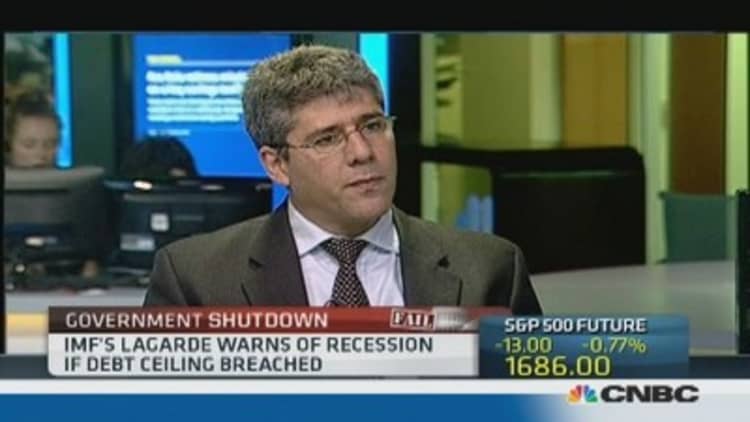The two-week political stalemate in Washington might be dominating the headlines, but across the Atlantic, euro zone ministers have been wrangling over a vital piece of financial regulation for months.
The much-debated pan-European banking union looks likely to dominate the agenda at a meeting in Luxembourg on Monday of the 17 euro finance ministers – known as the Eurogroup.
But economists are unconvinced there will be any significant progress on the issue, given the lack of government in Germany.
(Read more: Merkel's crucial week in German government talks)
The meeting also falls against a backdrop of political uncertainty in the U.S., with the country's government in partial shutdown because of a failure to reach agreement over the budget.
Chris Scicluna, head of economic research at Daiwa Capital Markets, said that Europe's policy issues - "thankfully" – were a lot more mundane than those in the U.S., and as such were unlikely to draw much attention this week.
Although banking union would be discussed, he said, no agreement was anticipated at this meeting. "One reason for the current policy inertia in the euro area is, of course, the political vacuum in Germany," he wrote in a note on Monday.
To take the burden of rescuing shaky banks off the shoulders of debt-laden countries – one of the main causes of the euro zone's financial crisis -- European leaders have agreed to create a system that would move supervision of the financial sector to a European level. The European Central Bank is due to take over – under the "Single Supervisory Mechanism" – in the autumn of 2014. Another part of the European Banking Union is a common deposit insurance scheme to protect individual savings.

But the third part of the plan -- a single authority with the power to wind down struggling euro zone banks, known as the Single Resolution Mechanism (SRM) – has hit a roadblock. Germany has objected to SRM, arguing that such a body would mean a complete renegotiation of the European Union's founding treaties. Germany is the euro zone's biggest economy – and therefore its largest contributor to rescue efforts – and the country's voters have voiced their reluctance to foot the bill for other countries' mistakes.
(Read more: Greek 50-year bonds:Why they could be a good bet)
Any decision about the banking union has been put on hold while elections were being held in Germany – and looks set to be delayed further still while the process of forming coalition rumbles on.
"The CDU (Merkel's Christian Democratic Union) is still in coalition talks and no major decision on Europe will be entered into before a new German government is in place," Michala Marcussen, global head of economics at Societe Generale, wrote in a note on Sunday.
But she stressed that agreement on banking union was crucial – especially on the issue of the SRM.
"Does banking union delay matter? Yes! Washington has been grabbing the headlines, but recent disappointing developments on Europe's banking union merit attention," Marcussen wrote. "It is the SRM that has the teeth to rip apart the doom-loop between Europe's banks and sovereigns."
(Read more: Ireland risks long-term pain for short-term gain)
Without the SRM, sovereign risk premiums from bank funding costs were continuing to drag down already struggling euro zone countries' economic growth, she added.
UBS' Senior Economist Paul Donovan – who agreed that we "should not hope for much" at this week's Eurogroup – said banking union was even more important, given the economic uncertainty in America.
"Things like progress on banking union - that might actually get the euro area some insurance from the fallout of the U.S. situation - are not terribly likely," he said on Monday morning.
Instead, Scicluna said the focus this week would be on the second round of talks between Merkel's conservatives and Germany's main opposition party, the social democrat SPD.
"After which Merkel might well signal her preference to pursue formal coalition negotiations between the two party groupings," he said.
—By CNBC's Katrina Bishop. Follow her on Twitter @KatrinaBishop and Google


